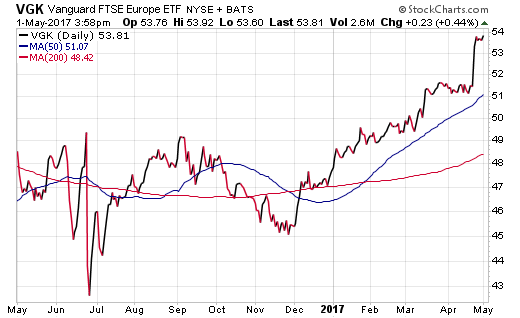The concept of investing in European stocks seems difficult to stomach considering the decade of lost returns versus their U.S. counterparts. A new post by Michael Batnick, Director of Research for Ritholtz Wealth Management, details the difficult 10-year journey for this foreign investment class. The U.S. has simply been the star outperformer on the global stage for so many consistent years that the home-bias phenomenon has been taken to a new level.
According to their research, U.S. stocks now make up 80% of the average U.S. investor’s equity portfolio. The remaining 20% is likely split among a variety of European, Asian, and emerging market exposure. This overweight exposure towards a high-flying asset class ultimately leaves many investors susceptible to being caught off guard as the pendulum swings in the opposite direction.
While it’s difficult to predict when the turning of the tide will eventually prevail, there is a prudent case to be made that U.S. investors should be re-considering their allocations to include a healthier dose of international exposure.
One region to consider for direct positioning is European stocks through a low-cost and diversified exchange-traded fund (ETF). There are currently 99 ETFs dedicated to regional, single country, or thematic exposure to Europe that make this process quite simple and transparent.
One of the largest ETFs in this category is the Vanguard FTSE Europe (NYSE:VGK). This low-cost index fund owns a broad assortment of nearly 1,300 publicly traded companies throughout the developed European region.

Top country weightings within VGK include the United Kingdom, France, and Germany through its market-cap weighted structure. Its top holdings are likely familiar to U.S.-based investors as well, with Nestle SA (SIX:NESN) and Royal Dutch Shell (LON:RDSa) Plc as the two largest placeholders. VGK charge an expense ratio of just 0.10% annually to own this highly diversified group of foreign stocks and the fund has $11.4 billion in total assets.
A similar competitor to VGK is the iShares Core MSCI Europe ETF (NYSE:IEUR) , which sports a comparable footprint of nearly 1,000 European stocks for a rock-bottom expense of 0.10% annually. These types of all-encompassing index profiles allow investors the ability to capture virtually all sectors and market capitalization exposure. Avid travelers might think of it as the “all inclusive” way to invest in European stocks.
Another international ETF strategy that has grown in popularity in recent years is currency hedging. This fresh dynamic allows U.S. investors the ability to own a basket of foreign stocks in tandem with short positions in host country’s currency.
For example, the WisdomTree Europe Hedged Equity (NYSE:HEDJ) owns 130 large-cap European equities alongside euro currency futures shorts. This provides an additional tailwind to the performance of the fund versus an un-hedged variant like VGK if the euro depreciates in value versus the U.S. dollar. HEDJ has $9.6 billion in total assets and charges an expense ratio of 0.58%.
The Deutsche X-trackers MSCI Europe Hedged Equity ETF (NYSE:DBEU) is another similar option that implements the currency hedging theme within its index-construction methodology. DBEU owns a larger swath of 450 stocks and charges an expense ratio of 0.45% compared to HEDJ’s 0.58% annually.
While not nearly as popular as their ultra-cheap passive counterparts, the smart beta or “enhanced index” group of ETFs is worth consideration. The WisdomTree Europe SmallCap Dividend (NYSE:DFE) is one example. This fund invests in over 300 small and mid-cap stocks within the European region that have a history of steady dividend payments. Stocks within DFE are weighted according to their annual cash payouts, rather than a market cap or equal-weighted methodology.
If fundamentals are pillars of your investment strategy, the First Trust Europe AlphaDEX (NASDAQ:FEP) may be suitable as well. This ETF uses a screening methodology to identify stocks with high scores in price appreciation, sales growth, price to book value, and return on assets. The goal is to hone in on high quality companies that results in a focused group of just 200 holdings. FEP has $313 million in total assets and charges a heftier 0.80% expense ratio for access to its evolved index construction technique.
The Bottom Line
The funds represented above are just a small slice of the opportunities for U.S. investors to carve out a portion of their portfolio in European equities. These vehicles offer the capability to immediately diversify overseas through dependable and low-cost stock allocations.
Nevertheless, as with any good investment thesis, the factors of timing and adherence to your personal risk tolerances must be primary considerations. Investors would be well-served to closely evaluate their existing portfolio and implement any changes with incremental steps to ensure it fits their goals.
Disclosure : FMD Capital Management, its executives, and/or its clients do not hold positions in the ETFs, mutual funds or any investment asset mentioned in this article. The commentary does not constitute individualized investment advice. The opinions offered herein are not personalized recommendations to buy, sell or hold securities.
